


Cerro Gordo County Iowa
Part of the IaGenWeb Project
|
The Globe Gazette

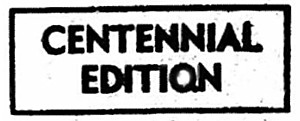
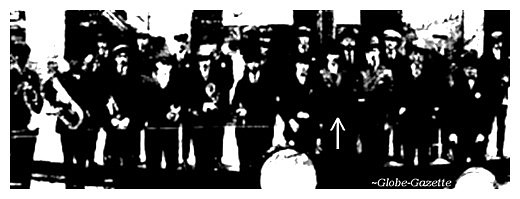
This picture shows Meredith Willson in the Mason City high school band in 1919. He is shown in the bottom row, fourth from the right. The band member have been identified as follows: Top row: Clarence Ausenhaus, Harding, Dick Zabru, Jack Gorman, Clarence Hickock, Bob McConnel, F. G. Gorman, high school music instructor who directed the band, Tom Wells, Bob Davidson and Harold Keidel. Bottom row: Carl Bruns, Mickey McGuire, Marison Dawson, George Wolf, Phil McLaughlin, Abbot Wolf, Ralph Shepherd, Meredith Willson, Wayne Tiss, Francis Letts and Ben Hands.
FIRST MILLINER
ORGANIZED PTA
CUSTER HER FAVORITE HISTORIC FIGURE
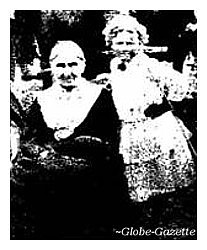
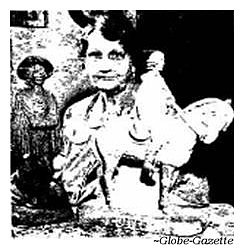
Gen. George Armstrong Custer became a favorite historic figure for Betty Russell, 411 E. State, from childhood. In the far left picture, Betty Russell is shown as a child with her grandmother, Betsy Spear Hartshorn, one of the first pioneers in Mason City. Mrs. Hartshorn was present at the birth of Gen. Custer at Rumley, Ohio, Dec. 5, 1839, and was the first to dress him. At far right, Miss Russell is shown with two statuettes of the famous general which she made from Mason City clay.
THREE GENERATIONS
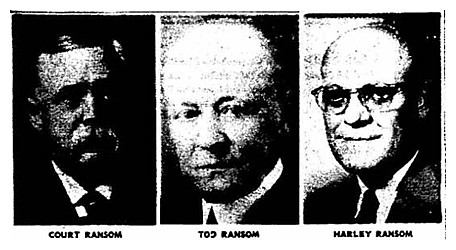
Ransom's Cigar Store, 120 N. Federal, has been a part of the business life of Mason City for almost a century, dating back to 1866 when Court Ransom came here from Rockford and opened a billiard parlor. The store was continued by his son, Tod Ransom, who was in business more than 50 years. Harley Ransom, third generation to have charge of the business, started with his father in 1919.
Lehmann Started in Leather Store Here 55 Years Ago
Lehmann went to work in 1898 for William Weigle to learn the leather business, then an expanding enterprise with horses used for transport and travel as well as on the farms. Seven years later Lehmann bougth out Weigle and moved the store to 1st S.E. Three years later when the Century Annex building was completed he moved his store back to the original location, where it has remained since. In 1936 Paul Griesemer of Garner bought out the store, but Lehmann continued as manager. NOTE: Edward died March 22, 1961, and was buried beside his wife Martha L. (May 11, 1887 - May 19, 1955) at Memorial Park Cemetery.
HONORED AT CENTENNIAL
[Page 28] Among those being honored at the Centennial celebration are Mrs. Helen Quick Dillon and Mrs. Margaret Quick Armstrong on their own account and in memory of their brother, the late Herbert Quick (1861-1925), Mason City's foremost contribution to literature, whose books depicted some of the dramatic scenes of the city's early life. NOTE: Among Herbert Quick's books were The Fairyland of America (1901), American Inland Waterways (1909), Yellowstone Nights (1911) and The Real Trouble with Farmers (1924).
LACE WEDDING GOWN and HIGH TOP SHOES
[Page 31] The apparel of bygone days has been the vogue for numerous parties this year as Mason Cityans entered into the spirit of the Centennial. The picture at right is an example. It shows Mrs. William D. McAuley, left, in a 75-year-old wedding gown of lace embroidery, and Mrs. R. C. Berrie modeling a stole, a plume of ancient vintage and a 75-year-old pointed high top laced shoes. The picture was taken at a party of the Catholic Daughters of America.
YOSELOFF BROTHERS BECOME PROMINENT WRITERS
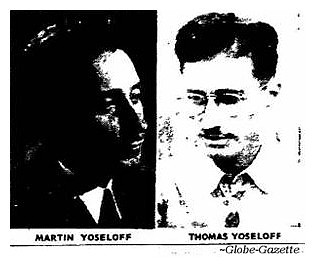
[Page 38] Two brothers, Tom Yoseloff and Martin Yoseloff, who spent a part of their early life in Mason City and now are in New York, have achieved outstanding success in the literary field. Both have published books that have rated high in literary criticism. With the publication of "A Fellow of Infinite Jest" and its most favorable reception by the critics in 1945, Thomas Yoseloff became an author of highly recognized merit. He had already achieved success in previous publishing efforts. The year before his "The Merry Adventures of Til Eulenspiegel" and the symposium entitled "Seven Poets in Search of an Answer" were published. Previous to that he had written several books under a pen name. From the standpoint of scholarship, amount of research and devotion to his subject, "A Fellow of Infinite Jest," is Yoseloff at his best. It was a fervent desire to win more readers for Laurence Stern, author of "Tristam and Shandy" and "Sentimental Journey" that inspired him to write the biography of this English author. Thomas Yoseloff also distinguished himself as a compiler. He published "Midwestern Sampler," an outline of the prose and poetry writers of the Middlewest and then went on to "Southern Sampler" and "Western Sampler." Martin Yoseloff started his writing career in 1943, when in the Army he wrote "No Greener Meadows," recollections of his Iowa childhood. It was at this time he also wrote "City of Mardi Gras." The family moved to Mason City from Sioux City when he was a small boy. His second book, "The Family Members," published in 1948, was the study of an Iowa family and the ever widening effects of an innocent mistake on the part of the young daughter. In 1949 Martin Yoseloff wrote the novel, "The Girl in the Spike-Heeled Shoes," a deeply moving and ironic story of a girl who grows up on the streets of the town. Other works of Martin Yoseloff include "Profit in Postage Stamps" and "Dogs for Democracy," a story of how dogs helped to win the war. He did the narrative for "City on the Potomac."
ROBERT PARRISH TURNED FROM MAGIC TO WRITING FICTION
In the years that followed he distinguished himself as a writer of books on magic and also in fiction. His book, "My Uncle and Miss Elizabeth," which Beechhuts press published in 1948, was well received and given praise by the critics. Parrish, who was born in St. Louis, Mo., in 1918, and reared in Mason City, became an expert at slight-of-hand at 15 and since then has written at least five books on magic, including "For Magicians Only," "New Ways to Mystify" and, in collaboration with George Boston, "Inside Magic." "My Uncle and Miss Elizabeth" is set in Iowa and Illinois in the 1930's. The story centers around the idiosyncrasies of a bachelor uncle, a man who exercised regularly, breathed deeply, kept a canary and clipped his coupons quarterly. It is also the story of a young man's awakening to the life around him, discovering of himself, his people and his town, seeing fondly remembered things through the eyes of youth.
PIONEER RESIDENT
[Page 39] Among Mason City residents who spanned the pioneer and modern periods was Mrs. Alice Cobb Brown, mother of Mrs. William H. Hathorn. She came to Mason City in 1865 with her parents when 7 years old from Mankato, Minn. She lived to be 92 years old in 1950. At the age of 15 years she had a teachers certificate and began teaching in rural schools and later taught in the Mason City schools.
CARRIER SALESMEN 40 YEARS AGO
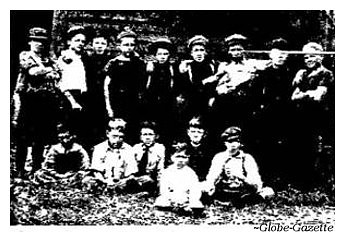
[Page 40] Globe-Gazette carrier salesmen about 40 years ago are shown in the above photograph. From left, standing, are Leo Carle, who later became superintendent of the composing room; Herschel Mays, Philip Sheridan, Charles Hammond, Harold Johnson, Robert Chambers, Chester McClung, LaVerne McConnell and Fred Hammond. Sitting are Howard Hurley, Paul Hurley, Roy Starr, Edward Toinby, George Walsh and John McConnell. At the present time the Globe-Gazette has more than 300 carrier salesmen. Of these 112 are in Mason City, 30 in Clear Lake and 165 in other communities.
"THERE I STOOD WITH MY PICCOLO"
[Page 40] Meredith Willson, whose book "There I Stood With My Piccolo," revealed that he was a writer as well as a composer, is shown with his favorite instrument. Willson is to have a prominent part in the Centennial program.
MEREDITH'S MOTHER
[Page 40] Mrs. Rosalie Willson, mother of three famous children, Dixie, Cedric and Meredith Willson, distinguished herself as the founder of the first kindergarten in Mason City.
WOMAN AT HARPSICHORD
[Page 41] In early Mason City days Mrs. H. P. Kirk was prominent in the development of music that came after the harsh days of pioneering were over. Here she is, black taffeta gown, bustle and all, seated at a four octave harpsichord. The photograph, which looks like it might be a reproduction of a painting, was the work of her husband, one of the early photographers in Mason City, who established the Kirk studio.
POLICE IN 1923
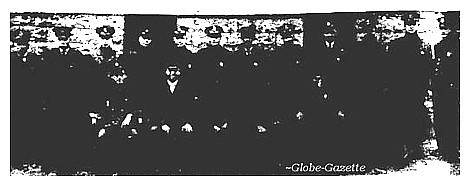
[Page 41] Only one member of the Mason City police force at the time this picture was taken in 1923 still remains with the department. That person is Capt. Leo Risacher. One of the officers in the picture, Harvey Wolfe, resigned as chief of the department in 1951 to become a member of the state liquor commission. The others have retired, moved from Mason City, or are deceased. From left, they are: Back Row - Henry Morphew, Stillman Dull, Earl Varner, Jim Steele, Ray Oulman, Ed Dunton, Tom Shannon, Richard Pierce, Harold Wolfe, Leon Colby, Frank Sanford and Jack Arnold; Front Row - Don Davis, then chief of police, Dick Hyde, desk sergeant, Leon Hood, Leo Risacher, and Capt. Con Walbaum.
THEY WERE ON THE CECIL STAGE
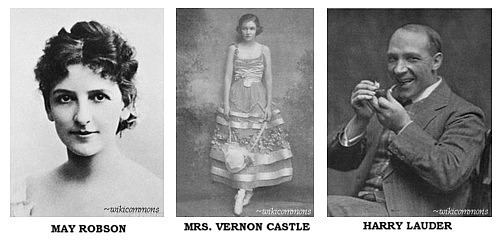
[Page 43] Among stage celebrities to appear at the Cecil Theater in the first decades of the century were the persons shown in the above picture. One of the most popular actresses to come to Mason City in those days was May Robson, who is shown above as she appeared here three or more decades ago. She was on the Cecil Theater stage at least five times in the space of a decade, appearing in "One Night Out" Nov. 29, 1912. She was here twice in 1916, in "The Making Over of Mrs. Matt" and "The Rejuvenation of Aunt Mary." In 1920 she played in "Nobody's Fool" and in 1921 in "It Pays to Smile" to packed houses at the Cecil. When Harry Lauder was here in 1914 he got the message that his son had gone to France in World War I. Two weeks later the youth was killed. Mrs. Vernon [Irene] Castle, the noted dancer, was here in 1916 in "Watch Your Step." NOTE: The photographs from this issue of the Globe-Gazette did not scan well. Photographs above of Mae Robson, Irene Castle and Harry Lauder courtesy of wikicommons. The photograph of Irene is of her in her costume for her "Watch Your Step" performance. ~ SRB
[Page 44] Charles Leroy Smith came to Mason City in 1900 and became prominent in organizing the American Brick and Tile Company here. Plant No. 1 was built immediately after Smith's arrival and plant No. 7 was added in 1907. Later the plants became a part of the Mason City Brick and Tile Company.
Unless otherwise noted, photographs courtesy of The Globe-Gazette.
|
Return to Mason City Centennial Index Page Return to History Index Page Return to Cerro Gordo Home Page